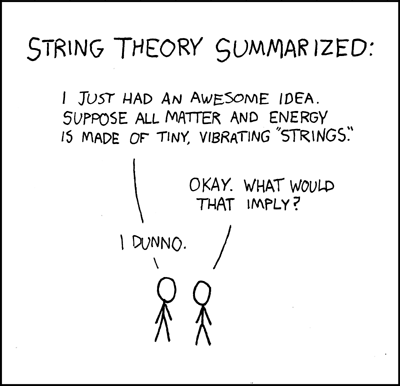
String Theory, the latest discovery in the world of Physics. The theory which leads us towards the ultimate truth and the answer to everything. Supposedly at least. Many people have supposedly come up with this idea throughout the 20th Century. In fact I do not really know who did come up with it. Einstein used some of it in some of his theories, Theodor Kaluza is said to have suggested it in finding a fifth dimension, Oskar Klein gave a demonstration on the unobservable dimension using circles. Many people are involved in the discovery of this fantastic theory. I could take all day to name just a few of the mathematicians, physicists and philosophers that took part.
The overall factor about this amazing discovery is that it can explain everything. The thing is though that with our current technology and probably with the technology we will have for the next 100 years we will never be able to prove this theory as the so called "strings" are so small that they no where near be seen with the strongest microscope we have at our disposal. So we cannot state it to be a discovery just yet as we cannot prove it so it is only a theory at this stage. This is where most physicists have the problem with this theory as it is not physics, but philosophy. In fact this has been such an argument that a new group has been established to study this theory called the "Theoretical Physicists" which combines quantum Mechanics with General Relativity. In one of his books in which he called string theory a failure Jim Holt said:
"For more than a generation, physicists have been chasing a will-o’-the-wisp called string theory. The beginning of this chase marked the end of what had been three-quarters of a century of progress. Dozens of string-theory conferences have been held, hundreds of new Ph.D.s have been minted, and thousands of papers have been written. Yet, for all this activity, not a single new testable prediction has been made, not a single theoretical puzzle has been solved. In fact, there is no theory so far—just a set of hunches and calculations suggesting that a theory might exist. And, even if it does, this theory will come in such a bewildering number of versions that it will be of no practical use: a Theory of Nothing."
Now these strings are said to be within the electrons, neutrons and protons of all atoms and are the source of the energy within the sub-atomic particles. There are meant to be millions of vibrating strings of all shapes and sizes through out the inner space of the sub-atomic particles. They continually vibrate moving around inside. Not too long ago many scientists thought that the atom was the smallest thing on this planet and then just over a hundred years ago in 1897 J. J. Thompson discovered the electron, which was at that time what was then though to be the smallest thing in the universe. Then came the discovery of the photons, then the nucleus which was split up into protons and neutrons and now this. Many years from now, whether String Theory is proved or disproved they will find something even smaller.
In conclusion, I will take the side of the proper scientists and not the theorists, if it is eventually proved then yes i will trust that truth, even though knowledge is still all a lie.











